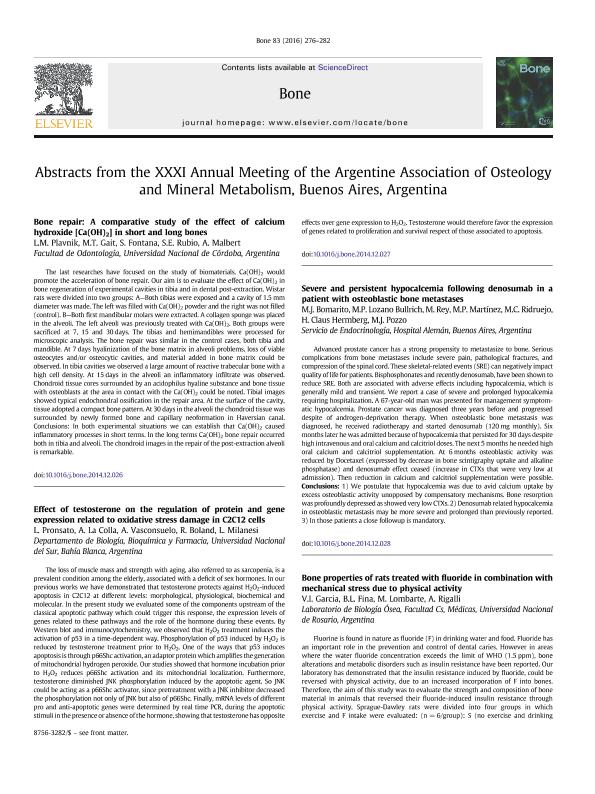Artículo
Effect of testosterone on the regulation of protein and gene expression related to oxidative stress damage in C2C12 cells
Pronsato, Lucía ; la Colla, Anabela Belén
; la Colla, Anabela Belén ; Vasconsuelo, Andrea Anahi
; Vasconsuelo, Andrea Anahi ; Boland, Ricardo Leopoldo
; Boland, Ricardo Leopoldo ; Milanesi, Lorena Magdalena
; Milanesi, Lorena Magdalena
 ; la Colla, Anabela Belén
; la Colla, Anabela Belén ; Vasconsuelo, Andrea Anahi
; Vasconsuelo, Andrea Anahi ; Boland, Ricardo Leopoldo
; Boland, Ricardo Leopoldo ; Milanesi, Lorena Magdalena
; Milanesi, Lorena Magdalena
Fecha de publicación:
02/2016
Editorial:
Elsevier Science Inc
Revista:
Bone
ISSN:
8756-3282
Idioma:
Inglés
Tipo de recurso:
Artículo publicado
Clasificación temática:
Resumen
The loss of muscle mass and strength with aging, also referred to as sarcopenia, is a prevalent condition among the elderly, associated with a deficit of sex hormones. In our previous works we have demonstrated that testosterone protects against H2O2-induced apoptosis in C2C12 at different levels: morphological, physiological, biochemical andmolecular. In the present study we evaluated some of the components upstream of the classical apoptotic pathway which could trigger this response, the expression levels of genes related to these pathways and the role of the hormone during these events. By Western blot and immunocytochemistry, we observed that H2O2 treatment induces theactivation of p53 in a time-dependent way. Phosphorylation of p53 induced by H2O2 is reduced by testosterone treatment prior to H2O2. One of the ways that p53 induces apoptosis is through p66Shc activation, an adaptor proteinwhichamplifies the generation of mitochondrial hydrogen peroxide. Our studies showed that hormone incubation prior to H2O2 reduces p66Shc activation and its mitochondrial localization. Furthermore, testosterone diminished JNK phosphorylation induced by the apoptotic agent. So JNKcould be acting as a p66Shc activator, since pretreatment with a JNK inhibitor decreased the phosphorylation not only of JNK but also of p66Shc. Finally, mRNA levels of different pro and anti-apoptotic genes were determined by real time PCR, during the apoptotic stimuli in the presence or absence of the hormone, showing that testosterone has opposite effects over gene expression to H2O2. Testosterone would therefore favor the expression of genes related to proliferation and survival respect of those associated to apoptosis.
Palabras clave:
Testosterone
,
Apoptosis
,
Skeletal Muscle
Archivos asociados
Licencia
Identificadores
Colecciones
Articulos(INBIOSUR)
Articulos de INSTITUTO DE CIENCIAS BIOLOGICAS Y BIOMEDICAS DEL SUR
Articulos de INSTITUTO DE CIENCIAS BIOLOGICAS Y BIOMEDICAS DEL SUR
Citación
Pronsato, Lucía; la Colla, Anabela Belén; Vasconsuelo, Andrea Anahi; Boland, Ricardo Leopoldo; Milanesi, Lorena Magdalena; Effect of testosterone on the regulation of protein and gene expression related to oxidative stress damage in C2C12 cells; Elsevier Science Inc; Bone; 83; 2-2016; 276
Compartir
Altmétricas



